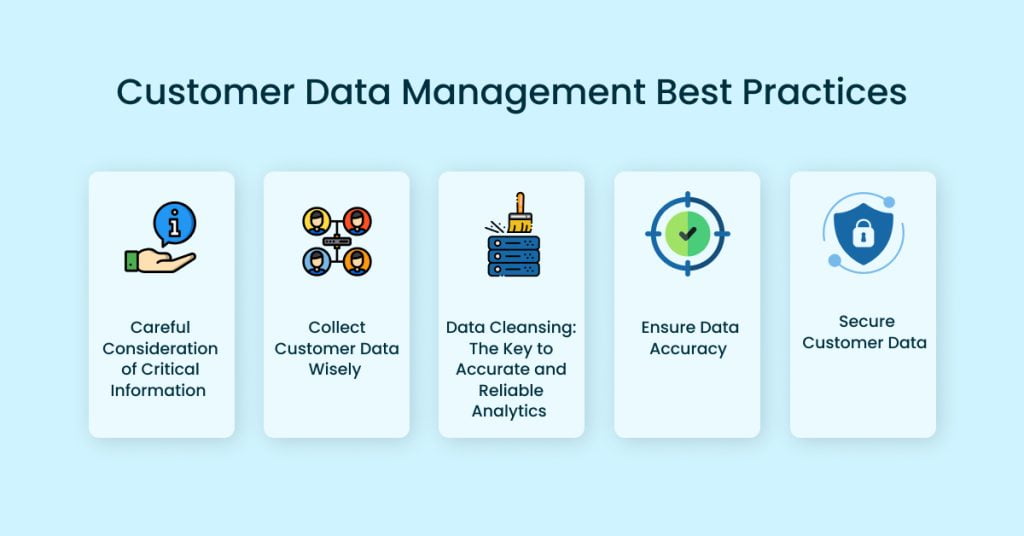
In the current era of advanced data analytics, the role of customer data management has evolved into an indispensable component of any company’s marketing strategy. When we talk about customer data, it’s more than just a simple repository of names and phone numbers. It’s a versatile asset encompassing a wide spectrum of information, including contact details, purchase histories, demographic and psychographic insights, and even real-time social media updates.
However, the days of managing this valuable data in cumbersome spreadsheets are long gone. In fact, relying on spreadsheets is not only inefficient but also risky. To harness the true potential of customer data, you need a robust infrastructure in place—a database or a customer relationship management (CRM) system. Renowned names like Salesforce, HubSpot, or Marketo offer powerful solutions for this purpose. The key is not just collecting data but understanding what data to collect and, equally important, how to safeguard it for precise customer tracking, prospect analysis, and measuring the effectiveness of your sales and marketing strategies.
Simplifying Customer Data Management
Customer data management is the systematic approach to gathering, organizing, cleansing, and analyzing the personal data of your customers within a company or organization. It’s the heart of data-driven decision-making and goes beyond mere customer lists.
By seamlessly merging customer data with their purchase history, organizations gain the ability to forecast sales trends, evaluate the success of sales campaigns, assess past sales performance, and even predict future behavioral patterns. The potential applications are as broad as your imagination allows.
For instance, in the world of finance, banks can amalgamate a customer’s personal information with their financial transactions. By leveraging artificial intelligence, they can not only expedite decision-making processes for loans and credit cards but also create tailor-made financial products and real-time banking experiences that cater to individual needs.
The key to thriving in this age of data is mastering customer data management. It empowers you to understand your customers deeply and deliver what they truly desire. By embracing best practices in customer data management, you unlock the potential for personalized experiences, data-driven insights, and the ability to stay one step ahead in a rapidly evolving business landscape.
Why is Customer Data Management Important?
Your customer data, often referred to as the lifeblood of your company, is second in importance only to your financial data. Losing it could spell disaster, and in some unfortunate cases, it has even led to business closures; hence, it is advisable to always have backup plans for such situations.
In the dynamic world of business, customer data management is a non-negotiable practice. Let’s delve deeper into the reasons why it’s indispensable and how it can safeguard your company’s future.
Safeguarding Information: Customer Data Management Best Practices
Effective customer data management involves collecting, storing, and utilizing customer information in a manner that ensures its security and integrity. It’s not just about preserving data; it’s about preserving trust. When your customers know that their data is in safe hands, they’re more likely to engage with your brand. Security breaches can lead to severe consequences, eroding your customers’ trust and causing lasting damage to your company’s reputation.
Leveraging Insights: The Power of Customer Data Management
Customer data isn’t just for safekeeping; it’s a treasure trove of insights waiting to be unlocked. By analyzing customer data, you gain a profound understanding of your clientele. This knowledge enables you to tailor your products and services to their needs, enhancing customer satisfaction and loyalty. Without proper customer data management, these valuable insights could remain untapped.
Regulatory Compliance: The Business Imperative
In the contemporary business landscape, regulations surrounding customer data are stringent. Neglecting compliance can result in hefty fines and legal troubles. Effective customer data management ensures that you adhere to these regulations, providing you with peace of mind and keeping your company out of harm’s way.
Backup Plan: A Safety Net for Your Data
As mentioned earlier, a backup plan is crucial. A well-thought-out plan can mitigate the impact of data loss or breaches, ensuring minimal disruption to your operations. Customer data management plays a pivotal role in this context, as it dictates how quickly and efficiently you can recover your essential customer information.
Customer data management is not a choice; it’s a necessity. By implementing best practices, you can safeguard customer data, unlock valuable insights, maintain regulatory compliance, and establish a robust disaster recovery plan. In doing so, you protect your company’s most precious asset and secure its future in an increasingly data-driven world.
Customer Data Management Best Practices

In the world of business, data is king. But it’s not about collecting every piece of information under the sun; it’s about smart, effective customer data management. Here are the five best practices to help you navigate the data maze, ensuring you collect the right data, keep it accurate, and, most importantly, secure it.
- Careful Consideration of Critical Information
Customer data management starts with making smart choices about the data you collect. It’s tempting to gather as much information as possible, just in case it might come in handy someday. But, as the digital age advances, less is often more. Before you ask for a piece of data, ask yourself why you need it.
For instance, are fax numbers necessary in the era of high-speed broadband and digital communication? Likely not. If your business doesn’t ship physical products, is it essential to collect mailing addresses? Probably not. What truly matters is having an email address and a phone number to stay in touch with your customers.
Additionally, it’s crucial to track how your customers discovered your business and which messages resonate with them. This information empowers you to tailor your marketing strategies effectively, investing your resources where they yield the best results.
- Collect Customer Data Wisely
Customer data collection should be a gradual process that respects your customers’ boundaries. It’s common for businesses to offer incentives like eBooks, newsletters, or special reports in exchange for customer information. However, it’s essential not to overwhelm your audience with data requests.
Consider a step-by-step approach to gathering customer data. Begin by requesting only the basics, such as a name and an email address. As your relationship with the customer deepens and you provide more value, you can ask for additional information. This approach respects your customers’ time and keeps them engaged, gradually guiding them through your sales funnel.
- Data Cleansing: The Key to Accurate and Reliable Analytics
Inaccurate and outdated data can be a costly burden. Imagine the frustration of receiving a magazine intended for teenage girls well into their thirties or continuously getting mail addressed to variations of your name that don’t match your identity. To prevent such mishaps, regular data cleaning is essential.
Data cleaning involves updating out-of-date information, merging and eliminating duplicate records, and removing entries for individuals who have long lost contact with your company. For example, some email newsletter platforms can identify subscribers who haven’t opened an email in months. You can send them one last message to verify their interest. If they don’t respond or opt-out, it’s time to remove them from your list.
Cleaning your data not only improves your email deliverability but also saves you the time and resources wasted on sending messages to uninterested recipients.
- Ensure Data Accuracy
Data accuracy is the cornerstone of effective customer data management. Nothing is more frustrating for customers than entering their information only to find it’s incorrect. To ensure data accuracy, consider using verification techniques such as asking customers to confirm their email address by entering it twice or sending a double opt-in confirmation email.
Numerous off-the-shelf data verification tools can seamlessly integrate with your CRM platform to validate email addresses, phone numbers, and mailing addresses. Remember that data accuracy is critical; incorrect data can result in unsent emails, missed marketing opportunities, and ultimately lower sales.
- Secure Customer Data
In the digital age, data security is paramount. Safeguarding sensitive information like credit card details, social security numbers, personal health data, and financial information is not just a best practice; it’s a legal and ethical obligation. A data breach can be disastrous, not only for your customers but also for your business.
To keep your customer data secure, maintain multiple backups, encrypt your data, and limit access. Consider establishing a tiered access system, with only a select few individuals having admin access to your data. This reduces the risk of accidental data corruption and ensures data quality. Additionally, invest in cybersecurity measures and make sure your business insurance covers potential cyber and data breaches.
By following these best practices, you’ll not only protect your customer data but also leverage it to enhance your business’s effectiveness and ultimately achieve better results.
Review Your Data
In today’s data-driven business landscape, managing your customer data effectively can be the game-changer you’ve been searching for. It’s not just about collecting data; it’s about understanding, organizing, and utilizing it to your advantage. Customer data management is more than a buzzword; it’s a strategic necessity.
By incorporating the above best practices, you pave the way for improved marketing campaigns, increased sales, and more accurate analytics. Your data becomes an asset that empowers your decision-making, enabling you to tailor your products and services to meet your customers’ needs more effectively.
In a world where data is king, treating your customer data well is the key to unlocking your company’s full potential. Make it a top priority, invest in the right tools and expertise, and watch how your business reaps the benefits.
In conclusion, customer data management best practices are not an option; they’re a necessity. Treat your data well, and it will be the compass that guides your business to success. Neglect it, and you’ll find yourself adrift in a sea of missed opportunities and avoidable pitfalls.
Choose wisely, and remember that data management can make or break your business.
Customer Data Management Services by SquareOne
Customer data management is the cornerstone of success. SquareOne, your trusted partner in this dynamic field, offers the latest solutions that set the standard for customer data management best practices.
At SquareOne, we specialize in professional data management services that underpin modern businesses. We seamlessly integrate every aspect of your data’s lifecycle, ensuring efficiency and precision at every stage. From data retrieval to control, storage, access, and overall management, our comprehensive suite of services is designed to meet your business’s unique needs with expert finesse.
Why choose us? Because we understand that your data is more than just numbers; it’s an asset waiting to be harnessed. We’ve perfected the art of turning raw data into actionable insights that can drive your business forward. When you partner with SquareOne, you’re making the choice to take your data management to the next level.
It’s time to unlock the true potential of your data. Reach out to SquareOne today to discover how we can empower your business with seamless, efficient, and precise customer data management that ensures your success in the data-driven world.


















